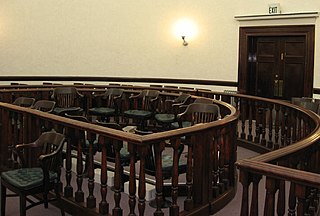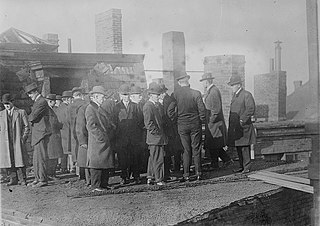
A jury trial, or trial by jury, is a legal proceeding in which a jury makes a decision or findings of fact. It is distinguished from a bench trial in which a judge or panel of judges makes all decisions.
Criminal procedure is the adjudication process of the criminal law. While criminal procedure differs dramatically by jurisdiction, the process generally begins with a formal criminal charge with the person on trial either being free on bail or incarcerated, and results in the conviction or acquittal of the defendant. Criminal procedure can be either in form of inquisitorial or adversarial criminal procedure.

A jury is a sworn body of people (jurors) convened to hear evidence and render an impartial verdict officially submitted to them by a court, or to set a penalty or judgment.
An inquisitorial system is a legal system in which the court, or a part of the court, is actively involved in investigating the facts of the case. This is distinct from an adversarial system, in which the role of the court is primarily that of an impartial referee between the prosecution and the defense. Inquisitorial systems are used primarily in countries with civil legal systems, such as France and Italy, or legal systems based on Islamic law like Saudi Arabia, rather than in common law systems. It is the prevalent legal system in Continental Europe, Latin America, African countries not formerly under British rule, East Asia, Indochina, Thailand, and Indonesia. Most countries with an inquisitorial system also have some form of civil code as their main source of law.
The judiciary of Germany is the system of courts that interprets and applies the law in Germany.

The law of Japan refers to the legal system in Japan, which is primarily based on legal codes and statutes, with precedents also playing an important role. Japan has a civil law legal system with six legal codes, which were greatly influenced by Germany, to a lesser extent by France, and also adapted to Japanese circumstances. The Japanese Constitution enacted after World War II is the supreme law in Japan. An independent judiciary has the power to review laws and government acts for constitutionality.

The Judiciary of Russia interprets and applies the law of Russia. It is defined under the Constitution and law with a hierarchical structure with the Constitutional Court and Supreme Court at the apex. The district courts are the primary criminal trial courts, and the regional courts are the primary appellate courts. The judiciary is governed by the All-Russian Congress of Judges and its Council of Judges, and its management is aided by the Judicial Department of the Supreme Court, the Judicial Qualification Collegia, and the Ministry of Justice, and the various courts' chairpersons. And although there are many officers of the court, including jurors, the Prosecutor General remains the most powerful component of the Russian judicial system.

Within the criminal justice system of Japan, there exist three basic features that characterize its operations. First, the institutions—police, government prosecutors' offices, courts, and correctional organs—maintain close and cooperative relations with each other, consulting frequently on how best to accomplish the shared goals of limiting and controlling crime. Second, citizens are encouraged to assist in maintaining public order, and they participate extensively in crime prevention campaigns, apprehension of suspects, and offender rehabilitation programs. Finally, officials who administer criminal justice are allowed considerable discretion in dealing with offenders.

The judicial system of Turkey is defined by Articles 138 to 160 of the Constitution of Turkey.
A system for trial by jury was first introduced in 1923 under Prime Minister Katō Tomosaburō's administration. Although the system generated relatively high acquittal rates, it was rarely used, in part because it required defendants to give up their rights to appeal the factual determinations made. The system lapsed by the end of World War II. In 2009, as a part of a larger judicial reform project, laws came into force to introduce citizen participation in certain criminal trials by introducing lay judges. Lay judges comprise the majority of the judicial panel. They do not form a jury separate from the judges, like in a common law system, but participate in the trial as inquisitorial judges next to professional judges in accordance with the civil law legal tradition - similar to the French cour d'assises - who actively analyze and investigate evidence presented by the defense and prosecution.
Jury duty or jury service is service as a juror in a legal proceeding. Different countries have different approaches to juries. Variations include the kinds of cases tried before a jury, how many jurors hear a trial, and whether the lay person is involved in a single trial or holds a paid job similar to a judge, but without legal training.
The legal system of South Korea is a civil law system that has its basis in the Constitution of the Republic of Korea. The Court Organization Act, which was passed into law on 26 September 1949, officially created a three-tiered, independent judicial system. The revised Constitution of 1987 codified judicial independence in Article 103, which states that, "Judges rule independently according to their conscience and in conformity with the Constitution and the law." The 1987 rewrite also established the Constitutional Court, the first time that South Korea had an active body for constitutional review.

The judicial reform of Alexander II is generally considered one of the most successful and consistent of all his reforms. A completely new court system and order of legal proceedings were established. The main results were the introduction of a unified judicial system instead of a cumbersome set of estates of the realm courts, and fundamental changes in criminal trials. The latter included the establishment of the principle of equality of the parties involved, the introduction of public hearings, the jury trial, and a professional advocate that had never existed in Russia. However, there were also problems, as certain obsolete institutions were not covered by the reform. Also, the reform was hindered by extrajudicial punishment, introduced on a widespread scale during the reigns of his successors – Alexander III and Nicholas II.
The legal system of Azerbaijan is based on civil law. As the country was a republic of the Soviet Union until 1991, its legal history has also been influenced heavily by socialist law. However, after the collapse of the Soviet Union, Azerbaijan became independent by enactment of the constitutional act of national independence on October 18, 1991. Azerbaijan started reformation of the legal system by the establishing of democratic reforms. This was followed by the adoption of the first Constitution in 1995 which is the foundation of the legislative system of the modern country. The Constitution creates the system of presidential republic with a separation of powers among the Legislative, Executive and Judicial branches of the government in order to prevent abuse of power.
The law of the Republic of China as applied in Taiwan, Penghu, Kinmen and Matsu is based on civil law with its origins in the modern Japanese and German legal systems. The main body of laws are codified into the Six Codes:
An examining magistrate is a judge in an inquisitorial system of law who carries out pre-trial investigations into allegations of crime and in some cases makes a recommendation for prosecution. Also known as an investigating magistrate, inquisitorial magistrate, or investigating judge, the exact role and standing of examining magistrates varies by jurisdiction. Common duties and powers of the examining magistrate include overseeing ongoing criminal investigations, issuing search warrants, authorizing wiretaps, making decisions on pretrial detention, interrogating the accused person, questioning witnesses, examining evidence, as well as compiling a dossier of evidence in preparation for trial.
A lay judge, sometimes called a lay assessor, is a person assisting a judge in a trial. Lay judges are used in some civil law jurisdictions. Lay judges are appointed volunteers and often require some legal instruction. However, they are not permanent officers. They attend proceedings about once a month, and often receive only nominal or "costs covered" pay. Lay judges are usually used when the country does not have juries. Lay judges may be randomly selected for a single trial, or politically appointed. In the latter case they may usually not be rejected by the prosecution, the defense, or the permanent judges. Lay judges are similar to magistrates of England and Wales, but magistrates sit about twice as often.
Indonesia is a civil law country with five major codes. Its criminal procedure code, the Kitab Undang-Undang Hukum Acara Pidana ("KUHAP"), determines the procedures and rights of individuals at different stages of the trial process.

Grand juries in the United States are groups of citizens empowered by United States federal or state law to conduct legal proceedings, chiefly investigating potential criminal conduct and determining whether criminal charges should be brought. The grand jury originated under the law of England and spread through colonization to other jurisdictions as part of the common law. Today, however, the United States is one of only two jurisdictions, along with Liberia, that continues to use the grand jury to screen criminal indictments.
In French criminal law, the investigation phase in a criminal proceeding is the procedure during which an investigating judge gathers evidence on the commission of an offense and decides whether to refer the persons charged to the trial court.







